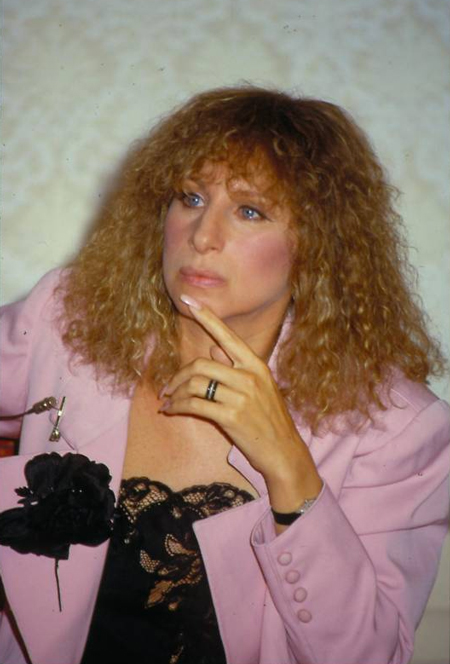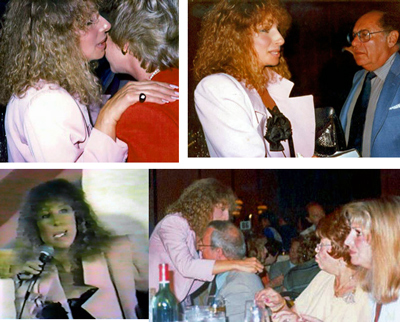Streisand ‘Listened To’ at the Crystal Awards
By Judith Michaelson
June 4, 1984

“When I was a singer, it was OK; when I was an actress, it was OK,” Barbra Streisand was saying, in her first public appearance on home ground since all that controversy over not receiving Oscar nominations for any of her work in Yentl.
“I started producing with A Star Is Born, and I remember getting a lot of flak ... And now directing. I think that men are allowed to be obsessed by their work, but women are only allowed to be obsessed by a man.”
Streisand, who produced, directed, co-wrote, starred and sang in Yentl, spoke so softly at the press conference preceding the annual Women in Film awards luncheon Thursday that her audience had to strain to hear her, encountering a second's delay in grasping the punch of her line. as she later told the 1,700 jamming the ballroom at the Century Plaza Hotel, she has learned that those in power need not shout to be heard: “They are listened to.”
And so Streisand was, too. Along with Mary Tyler Moore, off shooting a television movie in Toronto, and cinematographer Brianne Murphy, Streisand was to receive the Crystal Award, presented by Women in Film for achievement in movies and television and for providing an example for other women. (Appropriately, Valerie Harper, who played Rhoda to Moore's Mary in The Mary Tyler Moore Show, accepted the award on her friend's behalf.)
Streisand, elegant in a pink suit, black lace blouse, black fishnet stockings, spike heels and shoulder-length frizzed hair the shade of summer wheat, was clearly the draw. Mary Ledding, president of Women in Film, which was formed to “improve the employment, depiction and position of women in film and television,” noted that this year's luncheon was the largest ever held by the professional organization.
“I feel that it was actually more beneficial not to be nominated,” Streisand told the crowd of reporters and photographers in a press contingent three times the usual size for the Crystal Awards. “It made a statement ...” She said she was both “amused and touched” by the protest demonstrations on her behalf, and sidestepped labeling what had happened as discrimination. “It's a very, very complex issue,” she said. “Maybe they didn't like the film,” she quipped. Then she talked about those differences in the acceptance of obsessions.
As for all the reports of difficulties in the making of Yentl, Streisand said simply: “I was nurtured by the struggle. Life had a new purpose. The more we were turned down, the more persistent we became.” And the money Yentl is now making, she said, is only “the icing on the cake.”

At the luncheon, Streisand did not mention the Oscars and said she didn't really want to talk about the struggles in making the movie, although that was supposed to be her topic. After noting that this supposedly “small, ethnic film” did better in Texas and Taiwan than in New York—she saw Yentl as a “celebration of women”—Streisand said she preferred dealing with the phenomenon of “women against women” and the importance of women working together instead of backbiting their peers' successes.
“When Yentl came out, I was most anxious for women to review the movie—that is, until I read the reviews ... I was shocked because the sharpest, most vitriolic comments were made by women. It started me thinking about the way women view other women's success or failure ... Is it because we've been raised and trained to compete for men, and so we bring the same mentality of competition to our view of other women's achievements?
“It's like adolescent girls competing for a date with the football player,” Streisand continued, “while he's out on the field learning tactics, strategy and mutuality of interest. Men learn about teamwork, and women don't. Men learn about power, how to get it, how to use it; women don't ...
“I felt frightened by the enormity of making the film, but I also felt calm; I felt no need to raise my voice. You don't have to, when everyone is finally listening ...”
The struggles of women in the film industry were more graphically—and humorously—evident in the remarks of Brianne Murphy, first woman to be admitted to the American Society of Cinematographers.
Murphy, who was the cinematographer for Little House on the Prairie, told of her experiences “back in the 60s,” when she would be invariably pointed toward the makeup room while asking directions at a studio to its camera department. With a comic's timing, she mentioned the union official who told her that she'd be a full-fledged cinematographer “over my dead body,” and added, “Well, he's dead.” And she recalled then-Los Angeles County Dist. Atty. Evelle J. Younger, repeatedly asking her at a press conference whether her camera equipment wasn't too heavy, and how she had finally replied: “No heavier than carrying a kid.”
End.
[ top of page ]
